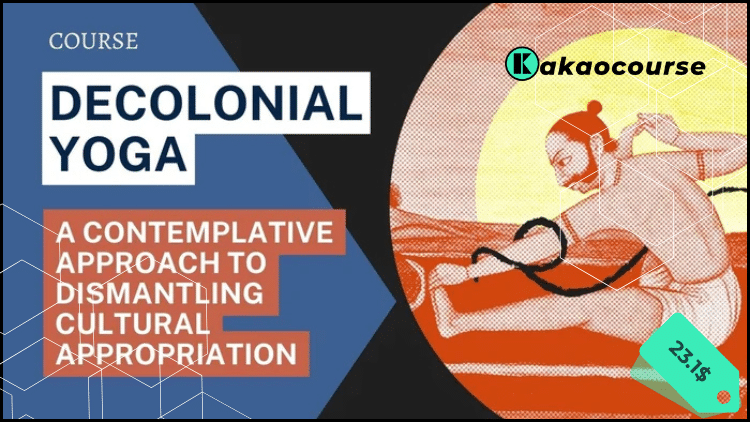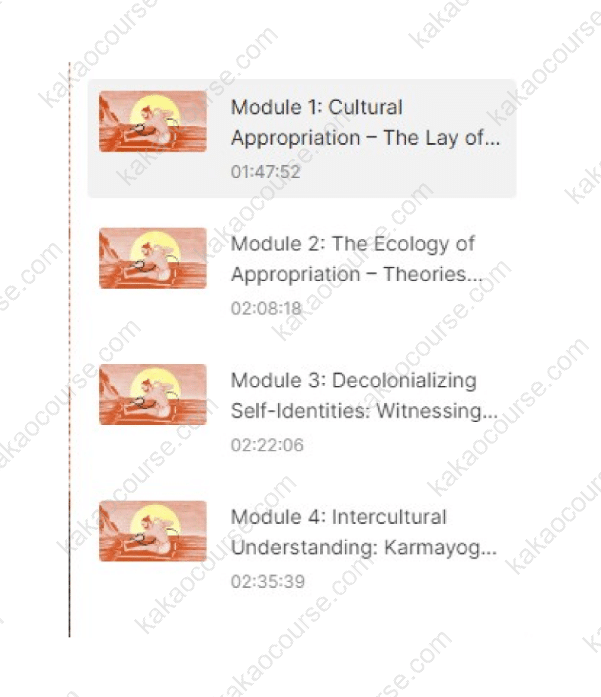Instant Download Decolonial Yoga: A Contemplative Approach to Dismantling Cultural Appropriation – Collection By Neil Dalal
Check proof of content, now:
Decolonial Yoga: A Contemplative Approach to Dismantling Cultural Appropriation – Collection By Neil Dalal, see what’s included in this course:
Decolonial Yoga: A Contemplative Approach to Dismantling Cultural Appropriation – Collection By Neil Dalal, Free Download PDF Sample Below:
About
Cultural appropriation is one of the most pressing issues in modern yoga and spirituality, yet it is often overlooked or dismissed. This avoidance makes sense, as addressing appropriation can unsettle long-held yogic identities, practices, and even economic structures. Still, engaging with it opens the door to deeper self-understanding, healing justice, and authentic practice. Confronting appropriation directly supports the well-being of communities whose traditions are borrowed, while also allowing practitioners to embody compassion, care, and equanimity in tangible ways.
This course creates a reflective learning space for examining appropriation with depth and honesty. Together, we will explore the histories, voices, and entanglements shaping this phenomenon and apply contemplative practices from classical yoga to start undoing appropriation, decolonizing yoga, and loosening ingrained colonial patterns. This work is important both for those who may unintentionally perpetuate appropriation and for those whose cultures and religions have been appropriated. While appropriation is a wide concern, our focus here will be on modern yoga and the South Asian diaspora.
Module 1: Cultural Appropriation – The Lay of the Landscape
This first module sets the stage by defining cultural appropriation and related dynamics such as colonization and desacralization. It also introduces a decolonial learning framework grounded in compassion, care, and critical awareness. Classical yogic methods help guide our process—for example, distinctions between knowledge and ignorance, the role of self-reflection, and yogic remedies for toxic mental patterns. These teachings shape a contemplative foundation for addressing appropriation.
Module 2: The Ecology of Appropriation – Theories and Debates
Here, we step back to consider the roots of modern yoga and its ties to classical Indian traditions, texts, and cultural lineages. We examine whether modern yoga has inadvertently caused harm to South Asian traditions or diaspora communities. The module also looks at how capitalism, orientalism, and white supremacy inform spiritual-but-not-religious worldviews. We will review key debates, critiques, and counterarguments, learning to hold these diverse voices with nuance rather than reduction.
Module 3: Decolonializing Self-Identities: Witnessing Presence, Saṃskāras, and Implicit Bias
This module shifts from intellectual understanding to personal application. Students explore saṃskāras (habitual tendencies) and how they sustain implicit bias or inherited wounds. Drawing on Upaniṣadic practices such as the seer–seen inquiry, participants cultivate awareness of how appropriation and colonization shape patterns of thought. Contemplative phenomenology and embodied practices are then used to release these deeply ingrained impressions, allowing a process of decolonizing the mind and identity.
Module 4: Intercultural Understanding: Karmayoga, Reciprocity, and an Ethic of Friendship
The final module turns toward external responsibility. We ask: What does it mean to decolonize practice and the yoga industry? How do we distinguish appropriation from appreciation? What responsibilities do Western yogis hold toward South Asian communities—and vice versa? Using teachings from the Bhagavadgītā, we uncover a vision of interconnection, reciprocity, and moral responsibility. This grounding helps frame decolonization as both a practice of justice and a ritual offering for collective well-being.
Students Who Take This Course Will:
-
Examine the dynamics of cultural appropriation and its intersections with orientalism, white supremacy, and New Age spirituality.
-
Engage with competing theories from yoga communities, South Asian diasporas, and academic scholarship.
-
Learn how to integrate yoga philosophy into the work of decolonization and unlearning appropriation.
-
Use yogic practices to challenge bias, cultivate virtues, and dismantle oppressive patterns.
-
Explore shared responsibilities between Western yoga practitioners and South Asian cultural communities.
Author
Neil Dalal
Neil Dalal is Director of Religious Studies at the University of Alberta, where he teaches in both the Philosophy Department and Religious Studies Program. He earned his PhD in Asian Cultures and Languages at the University of Texas at Austin, specializing in Sanskrit and Indian philosophy, and his MA in East–West Psychology from the California Institute of Integral Studies.
His research focuses on Advaita Vedānta, philosophy of mind, contemplative psychologies, and yoga traditions, grounded in Sanskrit texts and their living traditions. He co-directed Gurukulam (Sony Pictures/The Orchard), co-edited Asian Perspectives on Animal Ethics (Routledge), and published widely in journals such as the Journal of the American Academy of Religion, Journal of Indian Philosophy, and Journal of Hindu Studies.
Beyond academia, Dalal teaches within the traditional lineage of Śaṅkarācārya Advaita Vedānta. He lived for several years in India as a monk under the guidance of Swami Dayananda Saraswati, who authorized him to teach in 2002.











Reviews
There are no reviews yet.